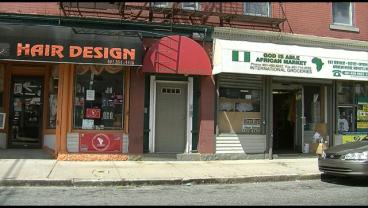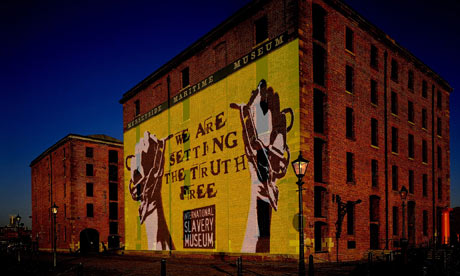 Editor's note: Jesse Eaves works as the senior policy adviser for child protection with World Vision, an international Christian humanitarian organization working in nearly 100 countries around the world. Mary C. Ellison currently serves as the director of policy for Polaris Project, a leading organization in the United States combating all forms of human trafficking and serving both U.S. citizens and foreign national victims, including men, women, and children. Together they are calling on U.S voters to make sure their senators pass a key anti-slavery bill.
Editor's note: Jesse Eaves works as the senior policy adviser for child protection with World Vision, an international Christian humanitarian organization working in nearly 100 countries around the world. Mary C. Ellison currently serves as the director of policy for Polaris Project, a leading organization in the United States combating all forms of human trafficking and serving both U.S. citizens and foreign national victims, including men, women, and children. Together they are calling on U.S voters to make sure their senators pass a key anti-slavery bill.With the upcoming elections, you can’t turn on the television without seeing a negative campaign ad or heated news segment giving Americans a glimpse of the political divisions that currently exist in our country.
While politicians argue over our future government, we lose sight of how the actions of our current government are impacting the lives of real people right now, like the millions of enslaved men, women and children in the U.S. and around the world at risk if Congress fails to pass the Trafficking Victims Protection Reauthorization Act by the end of the year.
Track the bill's progress
Human trafficking is “the recruitment, transport, transfer, harboring or receipt of a person by such means as threat or use of force or other forms of coercion, of abduction, or fraud or deception for the purpose of exploitation." But it also has another name: modern day slavery. There are now more slaves in the world today than any other time in human history.
Sadly, this is not an issue that’s unique to developing countries. It also happens right herein our own backyards.
Organizations like World Vision and Polaris Project work with trafficking survivors in the U.S. and abroad every day to help them regain what they have lost as a result of being trafficked.
Survivors come to us from across the globe, having been trafficked by spouses, by strangers, by employers and others all promising hope and a future to those in need.
Instead, these survivors have been beaten, insulted, demeaned and degraded, been forced into commercial sex or labor, worked in horrendous conditions for little or no pay, and with the constant fear that they themselves or others would be harmed or even killed.
Despite their brokenness, we daily see the resilience of the human spirit shine in the eyes of our survivors.
We have seen them graduate from English as a Second Language courses, get married, have children, find jobs, move into and make their own homes and have what we all want and need: the freedom to live their lives independently.
We are able to identify, assist, and humbly walk alongside these courageous survivors because the United States has created a framework to combat human trafficking that seeks to protect trafficking victims, prevent human trafficking and prosecute human traffickers - and it is called the Trafficking Victims Protection Act (TVPA). Because of this law and those who work to use it each day, these survivors have found their way back to freedom and dignity.
Twelve years ago in 2000, a divided Congress came together to pass the landmark piece of legislation that is the cornerstone of all U.S. efforts to combat modern-day slavery in our country and around the world.
In 2003, 2005, and 2008 Congress unanimously passed the reauthorization. But on October 1, 2011, this important piece of legislation, the largest piece of human rights legislation in U.S. history, expired and - for the first time since its historic passage - Congress is at risk of failing to reauthorize the legislation by the end of its session.
If the bill isn't reauthorized in September, we risk losing funding for 2013.
This failure threatens United States’ global leadership in the fight against modern-day slavery and jeopardizes the progress made over the last decade.
If Congress fails to reauthorize the TVPA by the end of the year, no one is certain of the impact on the 20 million people currently enslaved around the world.
This legislation benefits both survivors who participate in the programs created and funded by the TVPA and advocates who work daily to fight trafficking.
In the United States, TVPA-funded programs strengthen prevention of trafficking, fund taskforces across the country to protect victims and prosecute traffickers, and fund important tools such as the National Human Trafficking Resource Center Hotline.
Internationally, anti-trafficking programs set-up awareness programs, strengthen community level protection networks, pass stronger laws, and provide better victims services.
Congress is setting a dangerous precedent for future reauthorizations and ending a signal to other countries that fighting modern-day slavery is not a priority for the United States.
This is dangerous, not because it fails to recognize modern-day slavery as an issue, but because it will affect the men, women, and children around the world and here at home that suffer from slavery and those committed to fighting it.
For the last 12 years we have been a leader in the fight against modern-day slavery. Countries abroad will watch the U.S. elections closely to determine our priorities.
Congress needs to send a clear message, that no matter the outcome of the election, ending modern-day slavery is still a priority for the United States.
As Americans, we have a role to play. According to the senators themselves, it is up to the people to use the power of their voices to put a stop to this.
This is your chance to make a difference in this fight, so if you believe it is wrong to enslave another human being, we urge you to join thousands of Americans across the country on September 4, 2012 for the National TVPRA Call-In Day. On that day, we will flood Senate offices with calls urging passage of the Senate bill.
This is not the time for political games and bickering, but a time to put aside what divides us and unite on an injustice we all know is wrong. We hope you’ll join us. Learn more and help spread the word at www.passTVPRAnow.org



















